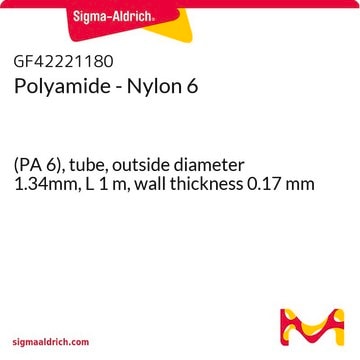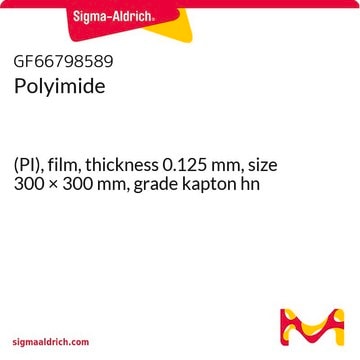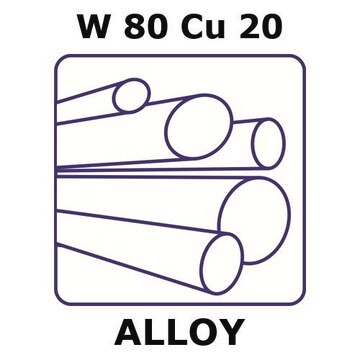GF50216352
Molybdenum
rod, 100mm, diameter 12mm, centerless ground, 99.9%
Sinónimos:
Molybdenum, MO007922
Iniciar sesiónpara Ver la Fijación de precios por contrato y de la organización
About This Item
Fórmula empírica (notación de Hill):
Mo
Número de CAS:
Peso molecular:
95.94
MDL number:
UNSPSC Code:
12141727
PubChem Substance ID:
NACRES:
NA.23
Productos recomendados
assay
99.9%
form
rod
manufacturer/tradename
Goodfellow 502-163-52
resistivity
5.0 μΩ-cm, 20°C
L × diam.
100 mm × 12 mm
bp
4612 °C (lit.)
mp
2617 °C (lit.)
density
10.3 g/mL at 25 °C (lit.)
SMILES string
[Mo]
InChI
1S/Mo
InChI key
ZOKXTWBITQBERF-UHFFFAOYSA-N
General description
For updated SDS information please visit www.goodfellow.com.
Legal Information
Product of Goodfellow
Elija entre una de las versiones más recientes:
Certificados de análisis (COA)
Lot/Batch Number
Lo sentimos, en este momento no disponemos de COAs para este producto en línea.
Si necesita más asistencia, póngase en contacto con Atención al cliente
¿Ya tiene este producto?
Encuentre la documentación para los productos que ha comprado recientemente en la Biblioteca de documentos.
Viswanathan S Saji et al.
ChemSusChem, 5(7), 1146-1161 (2012-06-14)
The electrochemical behaviors of molybdenum and its oxides, both in bulk and thin film dimensions, are critical because of their widespread applications in steels, electrocatalysts, electrochromic materials, batteries, sensors, and solar cells. An important area of current interest is electrodeposited
Ralf R Mendel
Plant cell reports, 30(10), 1787-1797 (2011-06-11)
The transition element molybdenum (Mo) is of essential importance for (nearly) all biological systems as it is required by enzymes catalyzing important reactions within the cell. The metal itself is biologically inactive unless it is complexed by a special cofactor.
Ralf R Mendel
The Journal of biological chemistry, 288(19), 13165-13172 (2013-03-30)
The transition element molybdenum needs to be complexed by a special cofactor to gain catalytic activity. Molybdenum is bound to a unique pterin, thus forming the molybdenum cofactor (Moco), which, in different variants, is the active compound at the catalytic
Chantal Iobbi-Nivol et al.
Biochimica et biophysica acta, 1827(8-9), 1086-1101 (2012-12-04)
Molybdenum cofactor (Moco) biosynthesis is an ancient, ubiquitous, and highly conserved pathway leading to the biochemical activation of molybdenum. Moco is the essential component of a group of redox enzymes, which are diverse in terms of their phylogenetic distribution and
Courtney E Sparacino-Watkins et al.
The Journal of biological chemistry, 289(15), 10345-10358 (2014-02-07)
Mitochondrial amidoxime reducing component (mARC) proteins are molybdopterin-containing enzymes of unclear physiological function. Both human isoforms mARC-1 and mARC-2 are able to catalyze the reduction of nitrite when they are in the reduced form. Moreover, our results indicate that mARC
Nuestro equipo de científicos tiene experiencia en todas las áreas de investigación: Ciencias de la vida, Ciencia de los materiales, Síntesis química, Cromatografía, Analítica y muchas otras.
Póngase en contacto con el Servicio técnico








